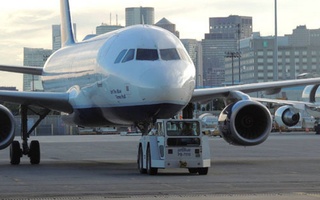This doesn't mean we won't be challenged, that we won't encounter difficult questions, that our lives will be stress-free. Nor does it mean that our lives are entirely disconnected from the "real" lives on the ground: the point of an airplane is, after all, to ferry between spaces of earth. But it's crucial that we realize how our ways of traveling affect our destination: what it means to be able to arrive easily, and to leave easily.
We can get to Pergamon, Paris, Berlin. We can go to Florida for spring break, or Costa Rica or London or California. We go abroad to sub-Saharan Africa, to Australia, to Eastern Europe. The world is a collection of islands connected by Coke and in-flight movies.
Put simply, the gift of mobility should not be underestimated. It affects our thoughts, dreams, hopes and perceptions. For many of us, the course of our future lives is open-ended--and yet we can say, with some certainty, that there are countries we never expect to pass through: destitution, epidemics, middle management.
Taking the bus made me uncomfortable and made me sad. I could not wait to get back to a stationary civilization.
Travel is much easier when the terrain is familiar, when the challenges--however difficult--are ones we understand.
On certain levels, the university teaches close analysis: to imagine in detail the places we are, to consider their intricacies. But the in-between places, the difficulties of journey, are somehow eased. The secret of flight is both a quick and far-reaching connectedness and a selective sight. Use wisely, we can bypass all kinds of roadblocks; use poorly, we become blind to what we have passed over.
Maryanthe E. Malliaris '01 is a mathematics concentrator in Lowell House. Her column appears on alternate Tuesdays.
Read more in Opinion
An Economic Plan for AfricaRecommended Articles
-
Record Crowds Jam All Rail, Air Facilities; Reservations Sold OutOnly opportunities for home going vacationers to find room in the over-crowded holiday transportation facilities are bus tickets, Northeast Airlines
-
Planes Grounded as Weather Slows All Rail, Highway TravelSnowstorms in Connecticut and other northeastern states snarled traffic last night as the Greyhound Bus Company announced that busses from
-
 Final Exam Schedule Posted
Final Exam Schedule Posted -
 Feldstein's Top Secret Economics Notes Left on an Airplane?
Feldstein's Top Secret Economics Notes Left on an Airplane? -
 "Air Travel" Soars to Success
"Air Travel" Soars to Success -
Three Cities, One WordI tell my students about the heartbreak of 2001, but I also speak of hope. That September I experienced the remarkable robustness of humanity.













